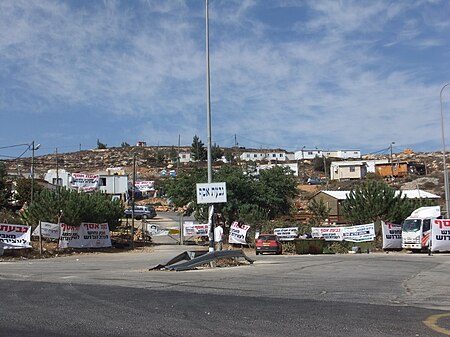Giv'at Asaf

Giv'at Asaf (Hebrew: גִּבְעַת אָסָף, lit. 'Asaf Hill') is an Israeli outpost in the West Bank. Located 3.5 kilometres (2.2 mi) from the settlement of Beit El, it falls under the jurisdiction of the Mateh Binyamin Regional Council. It has about 30 structures and is home to some 30 families. It was established in May 2001 after the murder of Asaf Hershkovitz, a resident of Ofra, for whom it was named. The international community considers Israeli settlements in the West Bank illegal under international law, whereas Israeli outposts are considered illegal both under international law as well as under Israeli law. According to the 2005 Sasson Report, Giv'at Asaf was built on privately owned Palestinian land, and is therefore also illegal under Israeli law.
Excerpt from the Wikipedia article Giv'at Asaf (License: CC BY-SA 3.0, Authors, Images).Giv'at Asaf
466,
Geographical coordinates (GPS) Address Nearby Places Show on map
Geographical coordinates (GPS)
| Latitude | Longitude |
|---|---|
| N 31.911388888889 ° | E 35.248888888889 ° |
Address
בית מדרש גבעת אסף
466
611
Judea and Samaria, Palestinian Territories
Open on Google Maps










